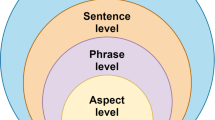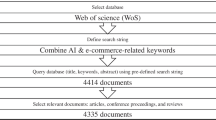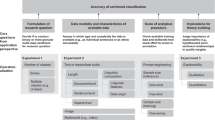Abstract
In recent years, the global paradigm of sustainable development has gained prominence, emphasizing the need to address present challenges while safeguarding future generations’ resources and opportunities. This paradigm integrates environmental, social, and economic dimensions, aligning with the Sustainable Development Goals (SDGs). Organizations and nations worldwide are increasingly adopting sustainable development strategies to ensure long-term economic growth, social equity, and environmental preservation. Simultaneously, public management has witnessed a transformation, leveraging data mining and artificial intelligence to enhance decision-making efficiency. This research explores the intersection of sustainable development and public management innovation, focusing on the intelligent analysis of large-scale data. Specifically, it introduces a novel sentiment classification methodology, combining BERT word vectors and PSO-LSTM optimization, for user-generated textual data within public digital repositories. By analyzing public sentiment, this research empowers public management platforms to make more informed decisions, fosters transparency, and contributes to the realization of sustainable development goals. This study lays the groundwork for future research in sustainable eco-service platforms, encompassing diverse data types and advanced technologies to enhance public management and sustainable development efforts.








Similar content being viewed by others
Data Availability
The data can be obtained according to the requirements.
References
Abdel-Basset, M., Abdel-Fatah, L., & Sangaiah, A. K. (2018). Metaheuristic algorithm: A comprehensive review. In Computational intelligence for multimedia big data on the cloud with engineering applications, 185–231.
Chinsha, T. C., & Joseph, S. (2015). A syntactic approach for aspect-based opinion mining. In Proceedings of the 2015 IEEE 9th International Conference on Semantic Computing, 43–50.
Dorigo, M. (1992). Optimization, learning and natural algorithms. PhD Thesis, Politecnico di Milano.
Eberhart, R., & Kennedy, J. (1995). Proceedings of the sixth international symposium on micro machine and human science. Nagoya, Japan, 4–6.
Farmer, J. D., Packard, N. H., & Perelson, A. S. (1986). The immune system, adaptation, and machine learning. Physica D: Nonlinear Phenomena, 22(1–3), 187–204.
Goralski, M. A., & Tan, T. K. (2020). Artificial intelligence and sustainable development. The International Journal of Management Education, 18(1), 100330.
Holland, J. H. (1975). Adaptation in natural and artificial systems: An Introductory analysis with applications to biology, control, and artificial intelligence. MIT Press.
Jeronen, E. (2020). Sustainable development. In Encyclopedia of Sustainable Managemen Springer International Publishing, 1–7.
Jones, B., & Jones, R. (2021). Public service chatbots: Automating conversation with BBC News. In Algorithms, Automation, and News, 53–74.
Koroteev, M. V. (2021). BERT: A review of applications in natural language processing and understanding. arXiv preprint arXiv:2103.11943
Latysheva, O., Rovenska, V., Smyrnova, I., Nitsenko, V., Balezentis, T., & Streimikiene, D. (2021). Management of the sustainable development of machine-building enterprises: A sustainable development space approach. Journal of Enterprise Information Management, 34(1), 328–342.
Liu, B. (2012). Sentiment analysis and opinion mining. Synthesis Lectures on Human Language Technologies, 5(1), 1–167.
Liu, X., Shi, Q., Liu, Z., & Yuan, J. (2021). Using LSTM neural network based on improved PSO and attention mechanism for predicting the effluent COD in a wastewater treatment plant. IEEE Access, 9, 146082–146096.
Majumdar, K., Roy, P. K., & Banerjee, S. (2021). Implementation of multi-objective chaotic mayfly optimisation for hydro-thermal-solar-wind scheduling based on available transfer capability problem. International Transactions on Electrical Energy Systems, 31(11), e13029.
Nam, K. J., Hwangbo, S., & Yoo, C. K. (2020). A deep learning-based forecasting model for renewable energy scenarios to guide sustainable energy policy: A case study of Korea. Renewable and Sustainable Energy Reviews, 122, 109725.
Pang, B., Lee, L., & Vaithyanathan, S. (2002). Thumbs up? Sentiment classification using machine learning techniques. In Empirical Methods in Natural Language Processing, 79–86.
Pang, B., Lee, L., & Vaithyanathan, S. (2002). Thumbs up? Sentiment classification using machine learning techniques. In Acl-02 Conference on Empirical Methods in Natural Language Processing, 79–86.
Qaisar, S. M. (2020). Sentiment analysis of IMDb movie reviews using long short-term memory. 2020 2nd International Conference on Computer and Information Sciences (ICCIS). IEEE, 1–4.
Ren, X., Liu, S., Yu, X., & Dong, X. (2021). A method for state-of-charge estimation of lithium-ion batteries based on PSO-LSTM. Energy, 234, 121236.
Sachs, J. D., Kroll, C., Lafortune, G., Fuller, G., & Woelm, F. (2022). Sustainable development report 2022. Cambridge University Press.
Senecal, S., & Nantel, J. (2004). The influence of online product recommendations on consumers’ online choices. Journal of Retailing, 80(2), 159–169.
Sennan, S., Ramasubbareddy, S., Balasubramaniyam, S., Nayyar, A., Kerrache, C. A., & Bilal, M. (2021). MADCR: Mobility aware dynamic clustering-based routing protocol in internet of vehicles. China Communications, 18(7), 69–85.
Shaheen, M. A. M., Hasanien, H. M., El Moursi, M. S., & El-Fergany, A. A. (2021). Precise modeling of PEM fuel cell using improved chaotic mayfly optimization algorithm. International Journal of Energy Research, 45(13), 18754–18769.
Shang, C., Gao, J., Liu, H., & Liu, F. (2021). Short-term load forecasting based on PSO-KFCM daily load curve clustering and CNN-LSTM model. IEEE Access, 9, 50344–50357.
Shi, X., Wang, Z., Zhao, H., Qiu, S., Liu, R., Lin, F., & Tang, K. (2022). Threshold-free phase segmentation and zero velocity detection for gait analysis using foot-mounted inertial sensors. IEEE Transactions on Human-Machine Systems, 53(1), 176–186.
Tan, L. K.-W., Na, J.-C., Theng, Y.-L., & Chang, K. Y. (2011). Sentence-level sentiment polarity classification using a linguistic approach. In 13th International Conference on Asia-Pacific Digital Libraries, ICADL2011, 43–50.
Wang, M., & Chen, H. (2020). Chaotic multi-swarm whale optimizer boosted support vector machine for medical diagnosis. Applied Soft Computing, 88, 105946.
Yan, F., Lin, Z., Wang, X., Azarmi, F., & Sobolev, K. (2017). Evaluation and prediction of bond strength of GFRP-bar reinforced concrete using artificial neural network optimized with genetic algorithm. Composite Structures, 161, 441–452.
Yazdani, M., & Jolai, F. (2016). Lion optimization algorithm (LOA): A nature-inspired metaheuristic algorithm. Journal of Computational Design and Engineering, 3(1), 24–36.
Yeh, C., Meng, C., Wang, S., Diriscoll, A., Rozi, E., & Liu, P., et al. (2021). Sustainbench: Benchmarks for monitoring the sustainable development goals with machine learning. arXiv preprint arXiv:2111.04724
Zhang, C., Zeng, D., Li, J., Wang, F. Y., & Zuo, W. (2009). Sentiment analysis of Chinese documents: From sentence to document level. Journal of the American Society for Information Science & Technology, 60(12), 2474–2487.
Zhou, X., Wan, X., & Xiao, J. (2016). CMiner: Opinion extraction and summarization for Chinese microblogs. IEEE Transactions on Knowledge & Data Engineering, 28(7), 1650–1663.
Zhuang, L., Jing F, & Zhu, X. Y. (2006). Movie review mining and summarization. In DBLP, 43–50.
Funding
The authors have not disclosed any funding.
Author information
Authors and Affiliations
Contributions
Guangsen Wei is responsible for the design of ideas and the interpretation of results. Weidong Chen is responsible for data collection and analysis and project management. Nima Dongzhou is responsible for the preparation of the first draft. All authors reviewed the results and approved the final version of the manuscript.
Corresponding author
Ethics declarations
Ethical Approval
This article does not contain any studies with human participants or animals performed by any of the authors.
Informed Consent
The authors declare that all the authors have informed consent.
Conflict of Interest
The authors declare no competing interests.
Additional information
Publisher's Note
Springer Nature remains neutral with regard to jurisdictional claims in published maps and institutional affiliations.
Rights and permissions
Springer Nature or its licensor (e.g. a society or other partner) holds exclusive rights to this article under a publishing agreement with the author(s) or other rightsholder(s); author self-archiving of the accepted manuscript version of this article is solely governed by the terms of such publishing agreement and applicable law.
About this article
Cite this article
Wei, G., Chen, W. & Dongzhou, N. Enhancing Sustainable Development Through Sentiment Analysis of Public Digital Resources: A PSO-LSTM Approach. J Knowl Econ (2024). https://doi.org/10.1007/s13132-024-01998-7
Received:
Accepted:
Published:
DOI: https://doi.org/10.1007/s13132-024-01998-7




